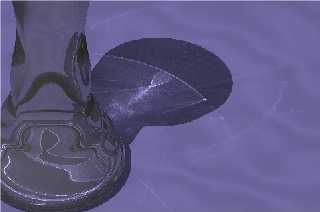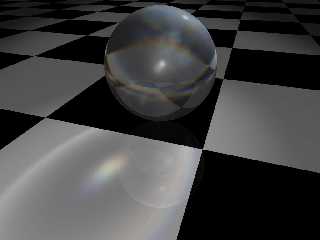 |
 |
|
 |
|
 |
|  |
|  |
|
 |
|
 |
|  |
|  |
|
 |
I've been working on my Gerbera-Image and tried
to use the dispersion of photons for a more realistic
look.
When tracing with a spacing of .0001 and using
a dispersion of 1.01, I get something around
40 million photons and the saved file is
over 750MB big.
Nontheless, the effect (though I've enlargened
the radius of a photon not by 5, as mentioned
in the docs, but by 7) is more or less useless.
It takes 2.5 hours to calculate the image, and the
result just isn't worth it.
Here's a close-up.
In case you're saying: "Well, THAT close..."
The image needs to be traced in extreme
sizes, so that I can print it with a very
good Laserprinter with incredible amount
of detail.
I'll be experimenting with three lightsources
(one for red, green and blue) and look if I
can get satisfying results that way.
Any comments, suggestions?
--
Tim Nikias
Homepage: http://www.digitaltwilight.de/no_lights/index.html
Email: Tim### [at] gmx de de
Post a reply to this message
Attachments:
Download 'dispersion.jpg' (80 KB)
Preview of image 'dispersion.jpg'

|
 |
|  |
|  |
|
 |
|
 |
|  |
|  |
|
 |
> I've been working on my Gerbera-Image and tried
> to use the dispersion of photons for a more realistic
> look.
> When tracing with a spacing of .0001 and using
> a dispersion of 1.01, I get something around
> 40 million photons and the saved file is
> over 750MB big.
40 Million? 4*10^8? That's a lot.
>
> Nontheless, the effect (though I've enlargened
> the radius of a photon not by 5, as mentioned
> in the docs, but by 7) is more or less useless.
> It takes 2.5 hours to calculate the image, and the
> result just isn't worth it.
> Here's a close-up.
>
> In case you're saying: "Well, THAT close..."
>
> The image needs to be traced in extreme
> sizes, so that I can print it with a very
> good Laserprinter with incredible amount
> of detail.
>
> I'll be experimenting with three lightsources
> (one for red, green and blue) and look if I
> can get satisfying results that way.
>
> Any comments, suggestions?
Yes, jitter.
--
__________________
RAY
Post a reply to this message
|
 |
|  |
|  |
|
 |
|
 |
|  |
|  |
|
 |
On Sun, 21 Apr 2002 01:38:52 +0200, Tim Nikias <tim### [at] gmx de>
wrote:
>I'll be experimenting with three lightsources
>(one for red, green and blue) and look if I
>can get satisfying results that way.
Three won't be enough, I fear.
>Any comments, suggestions?
When Darren came out with the dispersion patch, it didn't do caustics
(and photons weren't around yet IIRC), so I tried to fake it with
light sources. The idea is to use quite a few light sources in line
colored like the spectrum and use caustics (or now photons). Not too
realistic but looks good at least.
The attached image is an example. The dispersion inside the orb comes
from Darren's patch, the dispersion in the faked caustics was made
with that trick.
It used to be a nice trick before dispersion + photons came out. I
don't know why they didn't work in your case, too low dispersion
maybe?
Peter Popov ICQ : 15002700
Personal e-mail : pet### [at] vip de>
wrote:
>I'll be experimenting with three lightsources
>(one for red, green and blue) and look if I
>can get satisfying results that way.
Three won't be enough, I fear.
>Any comments, suggestions?
When Darren came out with the dispersion patch, it didn't do caustics
(and photons weren't around yet IIRC), so I tried to fake it with
light sources. The idea is to use quite a few light sources in line
colored like the spectrum and use caustics (or now photons). Not too
realistic but looks good at least.
The attached image is an example. The dispersion inside the orb comes
from Darren's patch, the dispersion in the faked caustics was made
with that trick.
It used to be a nice trick before dispersion + photons came out. I
don't know why they didn't work in your case, too low dispersion
maybe?
Peter Popov ICQ : 15002700
Personal e-mail : pet### [at] vip bg
TAG e-mail : pet### [at] tag bg
TAG e-mail : pet### [at] tag povray povray org org
Post a reply to this message
|
 |
|  |
|  |
|
 |
|
 |
|  |
|  |
|
 |
On Sun, 21 Apr 2002 12:33:40 +0300, Peter Popov <pet### [at] vip bg> wrote:
>The attached image...
...ahem!
Peter Popov ICQ : 15002700
Personal e-mail : pet### [at] vip bg> wrote:
>The attached image...
...ahem!
Peter Popov ICQ : 15002700
Personal e-mail : pet### [at] vip bg
TAG e-mail : pet### [at] tag bg
TAG e-mail : pet### [at] tag povray povray org org
Post a reply to this message
Attachments:
Download 'orb.jpg' (32 KB)
Preview of image 'orb.jpg'

|
 |
|  |
|  |
|
 |
|
 |
|  |
|  |
|
 |
Caustics don't give the same look as photons do,
for obvious reasons.
I think I'll just stick to white photons and
leave the photons out. It's also very
probable that you don't observe this
kind of dispersion very much, and then
this tiny detail may be not worth the
parsing time (2.5 hours and doesn't look
good = more time perhaps better?)
Thanks for sharing your experience!
Peter Popov wrote:
> When Darren came out with the dispersion patch, it didn't do caustics
> (and photons weren't around yet IIRC), so I tried to fake it with
> light sources. The idea is to use quite a few light sources in line
> colored like the spectrum and use caustics (or now photons). Not too
> realistic but looks good at least.
>
> The attached image is an example. The dispersion inside the orb comes
> from Darren's patch, the dispersion in the faked caustics was made
> with that trick.
>
> It used to be a nice trick before dispersion + photons came out. I
> don't know why they didn't work in your case, too low dispersion
> maybe?
>
> Peter Popov ICQ : 15002700
> Personal e-mail : pet### [at] vip bg
> TAG e-mail : pet### [at] tag bg
> TAG e-mail : pet### [at] tag povray povray org
--
Tim Nikias
Homepage: http://www.digitaltwilight.de/no_lights/index.html
Email: Tim### [at] gmx org
--
Tim Nikias
Homepage: http://www.digitaltwilight.de/no_lights/index.html
Email: Tim### [at] gmx de de
Post a reply to this message
|
 |
|  |
|  |
|
 |
|
 |
|  |
|  |
|
 |
You mean jittering the photons? I haven't looked
yet, but is that actually possible? I'll be looking at
the docs.
RAY wrote:
>
> Yes, jitter.
>
> --
> __________________
> RAY
--
Tim Nikias
Homepage: http://www.digitaltwilight.de/no_lights/index.html
Email: Tim### [at] gmx de de
Post a reply to this message
|
 |
|  |
|  |
|
 |
|
 |
|  |
|  |
|
 |
> You mean jittering the photons? I haven't looked
> yet, but is that actually possible? I'll be looking at
> the docs
The default amount of jitter is 0.4
[jitter <jitter_amount>]
Is in the 3.5 docs about photon mapping ( 6.10.2.1.) It's a global setting.
--
__________________
RAY
Post a reply to this message
|
 |
|  |
|  |
|
 |
|
 |
|  |
|  |
|
 |
On Thu, 21 Mar 2002 12:04:50 +0100, Tim Nikias <tim### [at] gmx de>
wrote:
>Caustics don't give the same look as photons do,
>for obvious reasons.
I never said they do. The trick should work with photons as well. I
don't know what causes your photons to malfunction (with a 400 MHz
K6/III I'm not the one to test dispersion photons...) but even so, the
trick I am offering should work. I lost the source long ago and
couldn't find in on this server but it shouldn't be too hard to do.
Peter Popov ICQ : 15002700
Personal e-mail : pet### [at] vip de>
wrote:
>Caustics don't give the same look as photons do,
>for obvious reasons.
I never said they do. The trick should work with photons as well. I
don't know what causes your photons to malfunction (with a 400 MHz
K6/III I'm not the one to test dispersion photons...) but even so, the
trick I am offering should work. I lost the source long ago and
couldn't find in on this server but it shouldn't be too hard to do.
Peter Popov ICQ : 15002700
Personal e-mail : pet### [at] vip bg
TAG e-mail : pet### [at] tag bg
TAG e-mail : pet### [at] tag povray povray org org
Post a reply to this message
|
 |
|  |
|  |
|
 |
|
 |
|  |




![]()